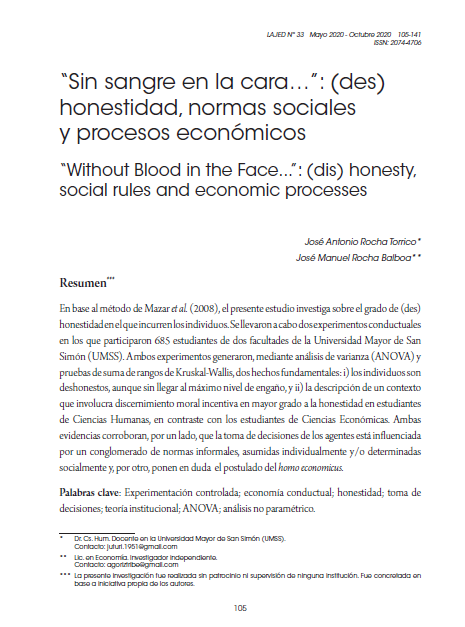“Without Blood in the Face...”: (dis) honesty, social rules and economic processes
DOI:
https://doi.org/10.35319/lajed.202033417Keywords:
Controlled Experimentation, Behavioral Economics, Honesty, Decision Making, Institutional fteory, ANOVA, Non-Parametric AnalysisAbstract
Based on the method of Mazar et al. (2008), this study investigates the degree of (dis) honesty that individuals incur. Two behavioral experiments were carried out in which 685 students from two Faculties of the Major San Simon University (UMSS) participated. Both experiments generated, through analysis of variance (ANOVA) and Kruskal-Wallis rank sum tests, two fundamental facts: i) individuals are dishonest, though without reaching the maximum level of deception and ii) the description of a context that involves moral discernment encourages honesty to a greater degree in Human Sciences students, in contrast to Economic Sciences students. Both evidence corroborate, on the one hand, that the decision-making of agents is influenced by a conglomerate of informal norms, individually assumed and/or socially determined. On the other hand, they question the postulate of the homo economicus.
Downloads
References
Abeler, J; Becker, A. y Falk A. (2014). Representative evidence on lying costs. Journal of Public Economics, 113(8), 96–104.
Ariely, D; Garcia-Rada, X; Gödker, K; Hornuf, L. y Mann, M. (2019). fte impact of two different economic systems on dishonesty. European Journal of Political Economy, 59, 179-195. Recuperado de: https://reader.elsevier.com/reader/sd/pii/S0176268018303744?token=60CDDCA3F887D401DFD028F4D8047D3826784BC53EC07CF71F4A1FFDD4B4DF881AFCDB1C26DCB611383F266ADDF8CC4D
Aronson, E. (1969). fte fteory of Cognitive Dissonance: A Current Perspective. Advances in Experimental Social Psychology, 4(1), 1-34.
Baumane-Vitolina, I; Cals, I. y Sumilo, E. (2016). Is Ethics Rational? Teleological, Deontological and Virtue Ethics fteories Reconciled in the Context of Traditional Economic Decision Making. Procedia Economics and Finance, 39(8), 108-114.
Braunstein, A; Pasternac, M; Benedito, G. y Saal, G. (1984). Psicología: ideología y ciencia. México, D. F, Cerro del Agua: Siglo XXI.
Díez, F. (1968). Academo. Bilbao, España: MAYFE.
Evans, D, K; Holtemeyer, B. y Kosec, K. (2019). Cash transfers increase trust in local government. World Development, 114(22), 138-155.
Gächter, S. y Schulz, J. (2016). Intrinsic Honesty and the Prevalence of Rule Violations across Societies. Nature, 531(7595), 496-499.
Gerber, S. (1999). Using SPSS for Windows: Data Analysis and Graphics. New York, Estados Unidos de Norte America: Springer Science+Business Media
Kerschbamer, R; Neururer, D. y Gruber, A. (2019). Do altruists lie less? Journal of Economic Behavior and Organization, 157(29), 560-579.
Kliger, D. y Qadan, M. (2019). fte High Holidays: Psychological mechanisms of honesty in real-life financial decisions. Journal of Behavioral and Experimental Economics, 78(13), 121-137.
Mazar, N; Amir, O. y Ariely, D. (2008). fte dishonesty of honest people: a theory of self- concept maintenance. Journal of Marketing Research. 45(6), 633-644.
North, D. C. ([1990]1993). Instituciones, cambio institucional y desempeño económico. Trad.: A. Barcena. México: Fondo de Cultura Económica.
Oxa, V; Rocha, J. M. y Herman, E. (2013). Vientos conductuales en Economía. Recuperado de: https://www.bcb.gob.bo/eeb/sites/default/files/6eeb/docs/sesiones%20paralelas/6EEB%20SP-06-1.pdf
Oxa, V; Rocha, J. M. y Vásquez, R. (2014). La conducta y las normas ex (im)plícitas en la Economía. Recuperado de: https://www.bcb.gob.bo/eeb/sites/default/files/7eeb/docs/7024.pdf
Smith, V. (1994). Economics in the Laboratory. Journal of Economic Perspectives, 8(1), 113-131.
Telcia, E; Maden, C. y Kanturc, D. (2011). fte theory of cognitive dissonance: A marketing and management perspective. Procedia Social and Behavioral Sciences, 24(20), 378-386.
Watkins, J. (2016). An Introduction to the Science of Statistics: From Theory to Implementation, Preliminary Edition. Recuperado de https://www.math.arizona.edu/~jwatkins/statbook.pdf
Woon, J. y Kanthak, K. (2019). Elections, ability, and candidate honesty. Journal of Economic Behavior and Organization, 157(38), 735-753.






